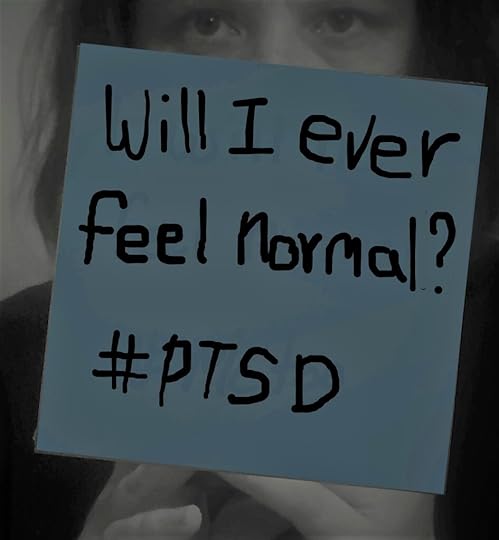The gift that keeps on giving
I had a counselor once, and that is how she described PTSD, as the gift that keeps on giving. I say this too now, usually with a half-smirk, furrowed brow, and a wry tone. Followed by a subtle eye roll, a sharp inward breath, and a low growl through gritted teeth.
I’ve lived most of my life with post-traumatic stress disorder (PTSD) from a trauma I didn’t remember. I never spoke to anyone about the trauma, and eventually repressed the memories. I was not diagnosed with PTSD until over 30 years after the events that caused it. For the past eight years, I’ve been working on a memoir, telling my story–a cathartic exercise in healing and hope. The book is filled with things I never told anyone–the main secret being a negative inner voice bent on my own self-destruction. She (the voice) went so far as to almost become another person residing in my head, never focusing her anger outward, only inward, in the form emotional and physical self-harm. This extra “person” and all of the accompanying behaviors, thoughts, and feelings I struggled so hard to hide from everyone were symptoms of my PTSD. Except I didn’t know I had it, I just thought I was crazy.

With the release of my memoir, my last line of defense to protect myself from the world and indeed, protect the world from discovering my secrets, is gone. I shed it willingly, with the belief that in telling my story, others can be helped. Perhaps they will see a piece of themselves (or someone they love) in my story and realize that they are not alone. That there is help, and there is hope.
The thing with a memoir is, it’s a snapshot in time. It is a picture of me, my life, and my relationship with my PTSD in that particular period. But PTSD is the gift that keeps giving. Just when you’ve learned to recognize and manage a trigger, something new will blindside you, seemingly out of no where. When that happens it can feel like nothing has changed, like you’ve not made any improvement, like the healing you thought you’d accomplished was imagined. When it happens to me, I fill with doubt. I devalue myself, dismiss everything I’ve accomplished, and view any healing I thought I’d done as a complete fallacy.
I’ve had some printing issues with my book (a story for another time). The other day, I received a box of 32 misprints to go with the 50 other misprints I already had. I called immediately to resolve this problem and the ensuing conversation was a blatant reminder that I held none of the power in that relationship. I felt unheard, invalidated, and utterly hopeless. Like a little kid being mercilessly bullied, or the little girl that suffered unimaginable acts all those years ago.
That’s the “gift” PTSD keeps on giving–triggers, reminders of that time you were helpless, terrified, unable to protect yourself. You return to that exact moment, and you relive it, every fear, every terrifying “I’m going to die” emotion dumps onto you all at once. Your mind may (or may not) be aware that you are actually in the present moment, but your body receives a chemical dump that tells it you are absolutely going to die. That phone conversation triggered the response me, and it pushed me right over the edge again–fear-driven anger, self-destruction, it all came flooding back.
I went to a pretty dark place, one filled with self-hatred and hopelessness. I was ready to give up on the book forever. Grabbing a copy from the box, I ripped it to shreds. I screamed, I cried, I told myself I was an idiot for thinking I could do anything worthwhile, that I was a useless fraud, that I’d written this book that was supposed to help people but I’m still broken. I’m not fixed, I’m not all better, I still have the same problems as before. NOTHING HAS CHANGED! I screamed to the empty room.

But something had changed.
After shredding that first book, I reached into the box to destroy another one–a just punishment for being a useless fraud, destroy the one thing I’ve poured my life into for the past eight years–my biggest achievement in my life so far. I held the book in my hand for a moment, turned it over, looked at my author picture on the back, and dropped it on the floor. I stared at it there for a moment, nudged it with my foot, and bent to pick it up, intent on tearing it to shreds. But I stopped short, straightened, and walked away.
I took a hot shower, tears mixing with water, circling the drain. When the water finally ran cold, I turned it off, wrapped myself in a big, fluffy towel, went to bed and cried some more.
It wasn’t until the next day that I finally processed what had happened, and realized I was wrong. Something had changed. The first realization was that, while the misprints are aggravating and costly (and not my fault), that is not what shattered me. It was the response from customer service, the feeling of powerlessness it evoked, the realization that they held all the cards, and I had nothing. It was the same relational dynamic I had with the person who harmed me all those years ago. The second realization was that I had managed to flip my response switch from self-destruct to self-care–from destroy my work, scream, and emotional self-harm to pause, hot shower and warm bed. I was ready to destroy that whole box of books, to reduce the physical representation of my healing to shreds of paper on the living room floor. But I stopped. I moved away from self-hate and turned toward self-care.

I realized I wasn’t a fraud, I truly had healed, my life was better now than the one within the pages of my memoir. I remembered the words of my former counselor, that PTSD is the gift that keeps on giving, a gift you don’t want but it keeps coming anyway. It specializes in crappy surprises, preferring to blast in from nowhere, without warning, a sneak attack designed to send you reeling, crushing you in a fragile moment. That is the nature of mental health issues–not only are they an invisible malady, the triggers can hide in plain sight, not making themselves known until it’s too late to protect yourself. But there is hope, I’d proven that to myself.
The human mind is a funny thing, it can fool itself into thinking it’s unaffected by past experiences or trauma, it can even forget the most horrific things. But the body, the heart, the soul–they remember. I don’t know that I will ever reach an end point, a moment when my PTSD file can be stamped CURED. I don’t think it works that way. There is hope though, we can learn to manage our trauma responses, to recognize when we’re triggered and find ways to bring ourselves back from the edge. There is a lot of help out there, counselors, therapists, and a variety of treatments (EMDR tapping and meditation have helped me a ton, along with talking about it in safe places, and writing about it). Please don’t give up, you’ve come so far, you’re so strong, you’re amazing–repeat after me–don’t give up, I’ve come so far, I’m so strong, I am amazing.
Peace my friend, carry on.
Post script: I was encouraged by another indie author to reach out to Amazon/KDP again, telling me my experience was not their normal policy. The executive customer relations director has reached out to me regarding my terrible customer service experience and the printing errors. He worked with his team to resolve my problem. They went above and beyond my expectations and have proven that they do in fact care about their authors, even the little ones, like me. I am very grateful. Thank you, Amazon/KDP.
Enter your email below to receive posts directly in your inbox! Don’t worry, I won’t spam you to death. Usually 1-2 posts a month.
Email Address:
Subscribe
Now available from Cheryl L. Eriksen Follow Me, FriendA Memoir of Undiagnosed PTSD, and the Healing Power of the Horse-Human Relationship
 __ATA.cmd.push(function() { __ATA.initDynamicSlot({ id: 'atatags-26942-61b23207a01f9', location: 120, formFactor: '001', label: { text: 'Advertisements', }, creative: { reportAd: { text: 'Report this ad', }, privacySettings: { text: 'Privacy', } } }); });
__ATA.cmd.push(function() { __ATA.initDynamicSlot({ id: 'atatags-26942-61b23207a01f9', location: 120, formFactor: '001', label: { text: 'Advertisements', }, creative: { reportAd: { text: 'Report this ad', }, privacySettings: { text: 'Privacy', } } }); });



